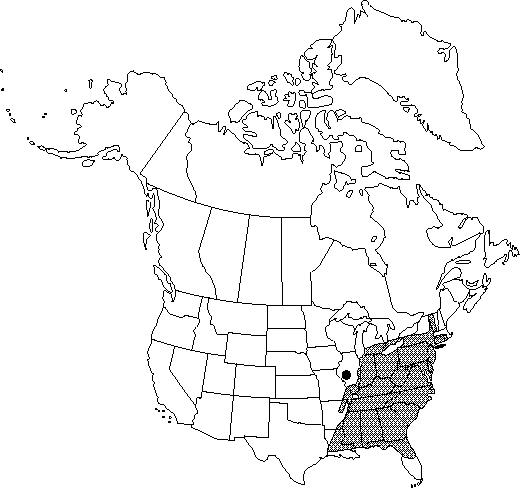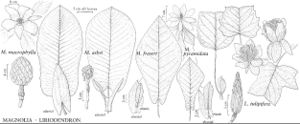Liriodendron tulipifera
Sp. Pl. 1: 535. 1753.
Trees, single-trunked, to 45 m. Bark light gray, thick, deeply furrowed. Stipules paired, light green, elliptic to oblanceolate, 20-45mm; petiole 5-11.5 cm. Leaf-blade commonly with 2 shallow upper lobes and 2 lateral lobes at broadest part, or sometimes squarrose and barely lobed, (6.5-) 7.5-15 (-23.5) × (8.5-) 12.5-18.5 (-25.5) cm; surfaces abaxially glaucous, adaxially bright green. Flowers campanulate; spathaceous bract 1, brownish, notched; tepals erect, adaxial orange blotch sometimes gummy, outermost tepals green to glaucous; stamens 20-50, 40-50 mm; filaments white; pistils 60-100. Samaracetums 4.5-8.5 cm, with numerous (1-) 2-seeded, imbricate samaras 3-5.5 × 0.5-1 cm, falling separately at maturity; receptacles with basal pistil persistent. Seeds (1-) 2.2n=38.
Phenology: Flowering spring.
Habitat: Rich woodlands, bluffs, low mountains, and hills
Elevation: 0-1500 m
Distribution

Ont., Ala., Ark., Conn., Del., D.C., Fla., Ga., Ill., Ind., Ky., La., Md., Mass., Mich., Miss., Mo., N.J., N.Y., N.C., Ohio, Pa., R.I., S.C., Tenn., Vt., Va., W.Va.
Discussion
Leaf and flower color variation are widespread in this species, but the variation is continuous and without any discernible taxonomic significance.
Liriodendron tulipifera is widely cultivated; a few cultivars have been introduced to horticulture, and the hybrid L. tulipifera × L. chinense is known. Liriodendron tulipifera is reported to have escaped from cultivation in Texas, but I have seen no specimens. The specimens from Barry and Ozark counties, Missouri, may not be indigenous.
Liriodendron tulipifera is the state tree of both Indiana and Tennessee.
Native American tribes used Liriodendron tulipifera for making canoes. Cherokee and Rappahannock tribes used bark of the roots as a bitter tonic and heart stimulant, and it was considered useful in healing fevers, rheumatism, and digestive disorders (D. E. Moerman 1986).
The largest known tree of Liriodendron tulipifera, 44.5 m in height with a trunk diameter of 3.02 m, is recorded from Bedford, Virginia (American Forestry Association 1994).
Selected References
None.
Lower Taxa
"/3lengthofextrorseanthers" is not declared as a valid unit of measurement for this property.
